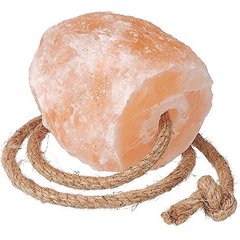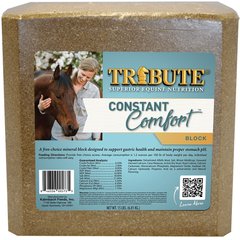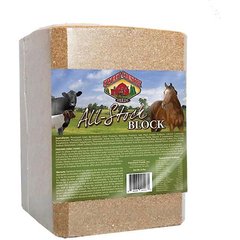What Is a Salt Block for Horses?
Groomee/iStock / Getty Images Plus via Getty Images
Walk into any horse barn or look in a pasture and you’ll likely see a salt block for horse, because salt is essential to all animal health. Salt is a main component of sweat and is vital in maintaining an appropriate water and electrolyte balance.
A full-sized horse (1,100 pounds) needs 1 ounce (2 tablespoons or 34 grams) of salt each day. An easy way to make sure your horse gets enough salt is by offering free-choice salt in a block or lick; other people may add loose salt to a horse’s daily grain if the horse likes the taste. This ensures your horse has access to salt when he needs it.
It is critical to always have free-choice water available for your horse, especially if they are being given salt supplementation, to prevent dehydration and unhealthy electrolyte balances in the body.
What Are Salt Blocks for Horses?
A salt block is a solid chunk of salt that provides a convenient way to offer salt to your horse. Mineral blocks are similar—they’re mostly salt but also include essential minerals and nutrients that may be lacking in a horse’s diet, such as:
- Calcium
- Magnesium
- Iron
- Selenium
- Other trace minerals
Salt also makes a horse thirsty by increasing the body’s electrolyte balance, therefore encouraging a horse to drink to bring the body back into homeostasis (healthy balance). This helps prevent dehydration in horses and reduces the chances of colic.
Salt is critical for:
-
Maintaining balance in all the horse’s cells, organs, and tissues
-
Hydration
-
Healthy muscle function
-
Proper nerve function
-
Maintaining healthy stomach acid
-
A healthy coat, hooves, joints, organs, and other tissues
-
A strong immune system if given in proper amounts
Types of Salt Blocks for Horses
Salt blocks for horses come in various shapes, sizes, and colors. You can buy them on a rope, in a brick-sized block, or in multi-pound cubes. Here’s a look at the options available:
Himalayan Salt Licks
Himalayan salt licks are pinkish blocks frequently sold on a rope. Mined in the Himalayan Mountains, these mineral-rich blocks include potassium and magnesium, which replenish electrolytes. Mined salt licks tend to have a slightly sweeter taste than non-flavored salt blocks, so they may be more appealing to many horses.
Sulfur Salt Blocks
Sulfur salt blocks contain salt, trace minerals, and added sulfur. These are most commonly given to livestock, such as cattle.
There are mixed opinions on whether horses should have sulfur salt blocks, so talk to your veterinarian or an equine nutritionist before offering one to your horse. Most horses on a complete feed or those that live on high-quality forage consume an adequate amount of sulfur daily.
Over-supplementing sulfur can cause:
-
Poor hoof quality
-
Weakened joints and bone structure
-
Neurologic conditions
-
Urinary issues
-
Other more serious complications
If you have any questions on your horse’s forage intake, grass and hay samples can be sent to the laboratory for analysis.
White Salt Blocks
White salt blocks for horses are typically the cheapest option because they only contain sodium chloride, a.k.a. salt. However, these may not be quite as palatable, so horses may or may not lick on a plain salt block.
Mineral Salt Blocks
Mineral salt blocks contain salt and additional minerals and nutrients such as zinc, iron, and others. Some blocks include specific vitamins, such as A, D, and E, or other ingredients to support overall health.
Garlic Salt Blocks
Garlic salt blocks for horses are made of salt, minerals, and vitamins with garlic added during manufacturing to potentially repel flies, lice, and ticks. Garlic salt blocks are not foolproof and can be dangerous. Garlic is toxic to horses, and in large amounts or over prolonged periods it can cause Heinz body anemia due to red blood cell hemolysis.
The Best Salt Blocks for Horses
With so many salt and mineral blocks to choose from, you might be wondering, “What is the best salt block for my horse?”
Consider these factors to help you pick:
-
Be sure the block or lick is labeled for horses. Products made for cattle, sheep, and other livestock may be unsafe for your horse.
-
Consult with your veterinarian to see if your horse needs minerals to make up for any dietary deficiencies.
-
Consider if your horse needs additional supplementation for gut health or fly control.
-
Read customer reviews to see which products horses like best.
Still trying to decide which block is best for your horse? Try one of these highly rated options in your barn:
The Tough-1® All Natural Himalayan Rock Salt Block Horse Treat is a favorite among horse owners because it is 100% natural and packed with iron, potassium, and magnesium. When hung with the attached rope, it also becomes a toy, keeping horses from getting bored. The rock-hard design allows the mined block to last longer outside than others.
Recommended Products
The Tribute Nutrition® Constant Comfort Gastric Health Horse Supplement 15-pound block not only includes essential minerals, but it also contains calcium derived from seaweed to support your horse’s gastric health by supporting a balanced pH level in the stomach, which may be helpful in preventing gastric ulcers.
Recommended Products
The Sweet Country Feeds® All Stock Block is a popular choice for its size and availability for multiple species housed together—it comes in a 33-pound block, which is enough to be shared by 10 to 20 animals. It’s also safe for cattle and goats.
Recommended Products
Do I Need a Salt Block Holder for Horses?
Investing in a salt block holder can prolong the block’s usability by keeping it clean and off the ground. Salt block holders come in a variety of sizes to match the size of the block you buy.
-
A small holder designed for a 4-pound block can be mounted inside a stall, run-in shed, or sturdy fence post.
-
A salt block pan keeps the lick a few inches off the ground for larger blocks offered in pastures.
-
Himalayan salt blocks often come on a rope you can hang inside or outside, which keeps the lick out of the dirt and manure.
Regardless of the type of holder you use, monitor your horse’s consumption and replace it before it runs out or looks too dirty to eat.
Salt Block for Horses FAQs
Are salt blocks good for horses?
Yes! Salt blocks and licks are good for horses. They provide free access to salt, an essential mineral for good health.
Are sulfur salt blocks good for horses?
Expert opinions are mixed. Talk with your veterinarian or an equine nutritionist before buying a sulfur salt block. In general, most horses do not need sulfur supplementation in addition to complete feeds or high-quality forage diets. When in doubt, forage analysis and blood work can help determine if your horse is deficient in sulfur and needs supplementation.
Due to the potential secondary adverse effects, it’s safest to avoid these if you aren’t certain your horse is lacking sulfur.



